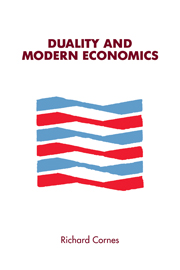Summary
This book has, I hope, provided a digestible introduction to the formal structure of dual relationships and their role in economic analysis, together with some appreciation of the tremendous variety of applications in both qualitative and quantitative work. A few final comments may be helpful.
First, let me emphasize again that the possibility of alternative formulations of economic problems presents the researcher with a choice, and this choice should be made in the light not only of the model under analysis but also of the precise questions that the analyst wishes to address. The literature on optimal indirect taxation, which I have not treated, provides a good example of this. Atkinson and Stiglitz (1980, ch. 12) discuss the problem of picking a set of commodity taxes that raise a given revenue target while imposing the minimum welfare cost on the taxed individuals, each of whom continues to behave as a price-taking optimizer in the face of the tax-distorted prices. The behavior of the taxed individuals can be modeled using their indirect utility functions. If this is done, the natural variables to be determined in the resulting optimization problem are the prices, or taxes. Individuals’ utility responses to price changes appear in the first-order conditions, and Roy's identity eliminates them and replaces them with quantities. The result is a set of first-order conditions that tell us how quantities must adjust to the imposition of the optimal tax structure, whatever that may be – see Atkinson and Stiglitz (1980, p. 373).
- Type
- Chapter
- Information
- Duality and Modern Economics , pp. 263 - 266Publisher: Cambridge University PressPrint publication year: 1992



